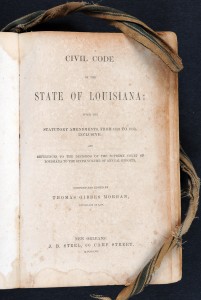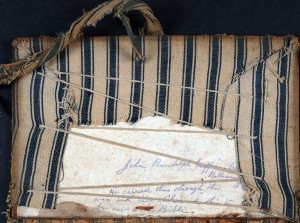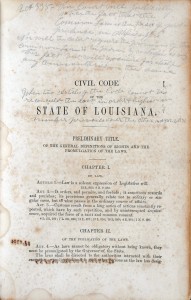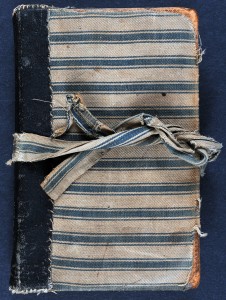Starting with this post, Litera Scripta will occasionally display images of some of the Bounds Law Library’s more unusual books. Several of these will be chosen for the revealing or insightful inscriptions they bear. These inscriptions may have been written to increase the book’s usefulness, or to complete some thought called forth, or in one case, to predict the inscriber’s future while playing a joke on future readers. Other posts will feature notable bindings, illustrations, interleavings, or insertions.

Certainly this post displays unusual elements of binding. The book is Thomas Gibbes Morgan, editor and compiler, Civil Code of the State of Louisiana: With the Statutory Amendments, from 1825 to 1853, Inclusive. . . (New Orleans: J.B. Steel, 1857). Bounds’ copy contains many annotations, some in pencil and some in an ink that has turned brown and in some instances has deteriorated on the page. The rear pastedown contains the following inscription: “John Randolph Griffin-Esq. Bellevue, La. He carried this through the war with him. Claimed this to be next to his Bible.”

According to one source, Griffin was born in Georgia in 1835, graduated from the University of Alabama in 1858 (second in his class), and moved to Bossier Parish, Louisiana, in 1859. He was elected to the Louisiana State Legislature in time to serve as chairman of the Committee on Military Affairs during the war. He died in San Antonio, Texas, in 1873. See Joiner, No Pardons to Ask, No Apologies to Make: The Journal of William Henry King, Gray’s 28th Louisiana Infantry Regiment (Knoxville: University of Tennessee Press, 2006), 262 n. 5.

Interesting as these features are, this book’s obvious point of interest is the slip cover that has been fashioned to cover the original calf boards and spine. At some point, the front board became detached, and some innovative person made a slip cover from bed ticking material, complete with ties that very much appear to have been intended as mattress straps.

The covering fabric is faded and dirty, and the stitching is crude but effective. The quality of the work may indicate some facility with sewing or upholstering, but it is impossible to say when the work was done.